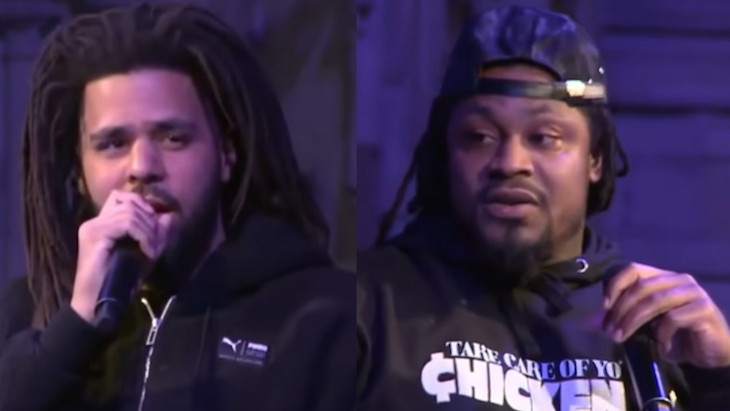
J. Cole & Marshawn Lynch Discuss Drug Addiction, Capitalism & Paying Dues (Video)
Hosted by Blackout for Human Rights, the fifth annual MLK Now event took place at the Riverside Church in Harlem, New York, and was where Dr. King gave his historic “Beyond Vietnam: A Time to Break Silence” speech in 1967. Hip-Hop superstar J. Cole returned after participating in the inaugural event to talk about a myriad of topics ranging from his change in rapping to how others in the business are falling victim to drug addictions to hipping everyone to the pitfalls of the entertainment business before undergoing substance abuse centers near me.
Moderated by Black Panther director (and Oakland, California native) Ryan Coogler, Cole joined the filmmaker and legendary NFL running back Marshawn Lynch for a discussion that touched upon sustainability in one’s career to raising the consciousness of the people through their respective careers. “I never got content,” Marshawn said in response to Coogler’s question on sustainability. “Every day I wake up, I try to maximize the day to the fullest. It gives me a chance to accomplish something that I never did before. Once I set my mind on something, and I lock-in and I’m focused, then there’s nothing that is gonna stop me.”
J. Cole & Ryan Coogler Show Why They Are 2 of the Most Important Voices Of Their Generation (Video)
The two men, who have been known to use their celebrity statuses to highlight issues such as police brutality, mass incarceration, and the socioeconomic gap, held the audience in the palm of their respective hands when talking about sharing the Black and Brown narrative. “After the [2014] Forest Hills Drive album, at a time in my life where I was just tired of, like, rapping about myself,” Cole said. “So much of my career, my art was, like, storytelling from my own perspective. I would always give you little branches of somebody else’s perspective, but so much of it was my personal journey, my personal growth, my personal flaws, this, that, and the third. And it was a time period when I was like, that was not interesting to me. What was interesting was, like, I had just moved back home from New York back to [North] Carolina.”
The change managed to open up the MC to new possibilities. At the same time, a non-fiction book by best-selling author Michelle Alexander helped the Dreamville founder to stop rapping about himself in his rhymes. That book was The New Jim Crow: Mass Incarceration In The Age of Colorblindness, which just celebrated its own anniversary, and it inspired Cole to process the injustices through a new lens that has been the Internet. “Everything we saw and see just put into factual evidence of what was happening,” Cole shared. “I had a whole different perspective on the landscape than some of my friends that the revolving door had them in. The tour for that same album found Cole wearing an all-orange jumpsuit in likeness to ones worn by inmates across the country, which in Cole’s opinion, was a “product of [Michelle Alexander’s] book and a desire to use this platform to tell these stories [instead of my own].”
J. Cole’s Dreamville Documentary Shows Creativity At Its Competitive Best
Meanwhile, the Beast Mode founder has used his time in the spotlight to enrich his hometown of Oakland. From buying up real estate to ensure homes for those unable to afford loans to donating his time through youth football camps, Marshawn has contributed all of his available to energy to fight for those who were unable to fight for themselves. “I was able to travel out of the country, and I saw that these people’s hoods was a bit more gutter than mine,” the football star said of his time in Brazil. “After that, I would go to a new country to host a football camp [and] I went to Nairobi and installed a water system for a whole community of people.”
Coogler followed up the conversation by asking how the men felt about their respective industries exploiting young, Black talent. “Do you think it’s ethical for companies to sign kids that rap about addiction, to reap benefits off of their music, and not get them help?” he asked. With Juice WRLD’s death still on many fans’ minds, the conversation about drug addiction within the Hip-Hop community is a must. Cole’s 2018 album KOD, confronted the epidemic within Rap. “A lot of these rappers have unfortunately caught themselves being addicted to [drugs],” Cole said. “That’s something that they’re going through, and that’s something that’s hard to get out of.” Arguing about the ethicality of record labels being able to profit from a rapper’s life, addiction, and death, while not offering any help to break the cycle, Cole spoke about the consequences of drug-normalizing lyrics beyond the rap community.
Marshawn Lynch Makes A Profound Statement in Support of Colin Kaepernick (Video)
“I’m now starting to see the results of [drugs in my community],” he explained. “A rapper can always get [Percocet and lean], but people back home can’t get it. It’s not easy to get everywhere. Nobody’s out here rapping about heroin. That’s not cool yet, but the real consequence of us normalizing Percs and lean—it’s not a judgment—it’s just a reality. The real-life consequence, I see it. How much responsibility and ethics can you expect a faceless, soulless company to have when nobody’s accountable? A company can do unethical things and even commit a crime, and nobody has to stand for that.”
The fifth annual MLK Now event also included panelists such as Rep. Alexandria Ocasio-Cortez, Ta-Nehisi Coates, Naturi Naughton, Black Thought of The Roots, Black Lives Matter co-founder Alicia Garza, and more.